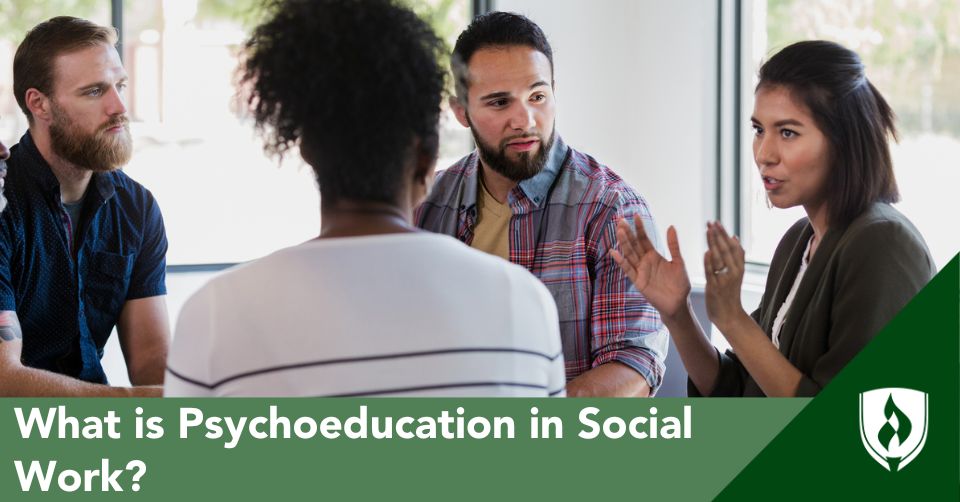
Psychoeducation is a basic but powerful tool used by social workers, therapists, counselors and other mental health professionals. It involves teaching clients—and often their families—about diagnoses, treatment options, developmental needs and ways to cope with life challenges.
By sharing knowledge through the therapeutic relationship, providers help build a common language that supports trust. Whether someone is navigating a new diagnosis, parenting struggles or serious mental illness, psychoeducation helps people feel more informed, less alone and better equipped to take part in their own care.
The clue is in the name—education! Psychoeducation in social work is about teaching clients, families and community members about psychology, mental health, mental health conditions and more.
Psychoeducation is an evidence-based intervention
Psychoeducational interventions are widely used in evidence-based practices like cognitive behavioral therapy. These interventions are often tailored to specific populations and diagnoses, such as schizophrenia, bipolar disorder or post-traumatic stress disorder.
For example, social workers know that social support is one of the most important treatment areas for patients with schizophrenia.1
Helping parents of children with schizophrenia understand what their child needs involves education. And helping adult schizophrenic patients understand their own disorder and access treatment can reduce the likeliness that they will have a full-blown psychotic episode.1
Psychotic disorders have a massive social impact as well, according to the schizophrenia bulletin.2 People do not exist in a vacuum. When someone in your community is experiencing a psychotic disorder, a mental illness, a crisis or hardships, it can effect hundreds of people.
By teaching clients about symptoms, treatment options and how thoughts, feelings and behaviors connect, psychoeducation becomes a critical part of helping clients manage their mental health. For many, this knowledge lays the foundation for sustained recovery and informed care.
How psychoeducation works in human services and social work
Psychoeducation can take many forms, depending on a client’s needs. These core areas are often part of effective psychoeducational work.
Explaining symptoms
Clients are often unfamiliar with their diagnosis when they receive it. Social workers often need to help the client identify how their mental illness impacts their life. Normalizing symptoms and explaining what they mean can help clients better understand their feelings and experiences.
Teaching coping skills
Providing tools to manage thoughts, emotions and behaviors is a key part of helping someone handle a diagnosis or trauma response. Understanding triggers and how to use coping strategies supports healing.
Paying attention to signs
In issues like addiction or serious mental illness, recognizing early signs of relapse is crucial.
Clients can learn to identify patterns and create a plan for how to respond—including how to get back on track if relapse occurs.
Offering social support
Whether facing trauma, grief, parenting stress or mental illness, clients often feel alone.
Group psychoeducation and peer connections offer validation, reduce stigma and help clients see they’re not alone. Additionally, human services assistants and social workers can help clients find the resources they need, whether that's transportation, housing, help with medical paperwork or more.
Why psychoeducation matters in social work
Psychoeducation is one of the most basic psychotherapeutic interventions providers can offer. It uses the therapeutic relationship to explain what a diagnosis means, how it can affect someone’s thoughts, feelings and behavior, and what strategies can help.
By offering clear information about distress, treatment options and coping skills, providers help clients better understand what they’re experiencing. This knowledge builds emotional regulation, supports crisis management and improves treatment adherence. It also plays a key role in relapse prevention by helping clients recognize early signs of distress and make informed decisions about their care.
For finding a way out of crisis
When someone is diagnosed with a mental illness, education is a key part of effective treatment. Many people have heard terms like bipolar disorder, post-traumatic stress disorder or obsessive-compulsive disorder but don’t fully understand what they mean.
Many people don’t know, for example, about environmental risk factors that are impeding their recovery or worsening their health and mental illness symptoms.2
Psychoeducation helps explain these conditions in ways that empower clients to better understand their experiences. Support groups and peer providers play an important role here—sharing personal stories and lived experiences helps clients feel less alone while providing real-life context to complex issues.
Learning about a diagnosis, treatment options and early signs of distress gives clients the tools to make informed decisions about their care.
For families navigating mental illness
When supporting a client, family members play an essential role in the client's success, and family treatment involves building a system of support.
Family psychoeducation is especially valuable for family members to help inform their understanding and ability to support the identified client. Often, family involvement hinges on the psycho-educational approach, as understanding can inform relapse prevention, family therapy, crisis management, or other forms of social support.
Family members who understand the mental illness issues facing their loved ones and how to offer effective support have better treatment adherence because they understand issues like crisis, relapse prevention, and other treatment interventions.
Family members benefit from group psychoeducation where they meet with multiple family groups who are also experiencing the same issues. It always helps to know you're not alone.
Bringing multiple family groups together who are experiencing the same issue can be normalized, reduce stigma, and help create a community of support. This social support helps individuals process their feelings and learn about the treatment options, the diagnosis and the challenges present.
For parenting support
Psychoeducation isn't just for clients navigating mental illness. It's also extremely powerful as a parenting support.
Raising a child is exhausting and confusing. While professionals who work with children often have extensive training in child development, most parents do not. Kids aren’t born as mini-adults—they go through important stages of learning beyond just academics.
Parents tend to fall back on the information they received from their own upbringing, which can be counter-productive since we now know far more about brain development than we did, say 50 years ago.
Through psychoeducation, parents can better understand social, emotional and cognitive growth. They learn how children develop skills like self-expression, emotional regulation and how to build healthy relationships.
To get an idea of what I mean, check out Child Development Research Is Changing Early Childhood Education.
This kind of support validates the challenges of parenting and provides caregivers with tools to respond with greater confidence and care. They have to learn to be social, express thoughts and emotions, and how to be in a relationship.
How to bring psychoeducation into real-world practice
Psychoeducation is one of the most basic and effective therapeutic techniques. When used with empathy and intention, it helps health professionals and clients speak a shared language about mental health.
Educating clients about their diagnosis, symptoms, and treatment options lays the groundwork for more advanced interventions by helping clients and families make sense of what’s happening—and what they can do about it.
Therapeutic relationships play a key role. When providers take time to explain what clients are experiencing and why, it strengthens the bond and empowers clients to take an active role in their care.
Teaching with care and clarity is often the first step toward lasting change.
Shaping a stronger future With psychoeducation in social work
Empowered families and communities are the backbone of a healthy society. If you are interested in social work, you probably already know the impact one person can have on many others--for better or for worse.
Graduates from human services programs can seek out roles that give them a chance to work with families (found families included!). While you can study psychology for years and years and never run out of things to learn--you can also keep reading up on psychoeducation as you go, adding new research findings to what you already understand about the mind.3
Psychoeducation is a foundational part of effective treatment. It helps clients and family members better understand mental health challenges and the strategies used to address them.
By building shared language and offering clear, supportive information, providers can create stronger therapeutic relationships and empower clients to manage life’s challenges with more confidence. When care strategies are rooted in understanding rather than assumption, everyone is better prepared to participate in the healing process.
If that sounds like a role you'd be interested in, check out What Is a Family Services Worker? A Closer Look at This Community Support Career.
1Timothy Tunner, How Social Workers Help Individuals With Schizophrenia, HelpStartsHere.org. https://www.helpstartshere.org/living-with-illness-helping-schizophrenics/
2Bosma MJ, Marsman M, Vermeulen JM, Huth KBS, de Haan L, Alizadeh BZ, Simons CJP, Schirmbeck F. Exploring the Interactions Between Psychotic Symptoms, Cognition, and Environmental Risk Factors: A Bayesian Analysis of Networks. (Nov. 25, 2024). Schizophrenia Bulletin, PubMed. https://pmc.ncbi.nlm.nih.gov/articles/PMC12236352/
3Rasmussen University’s Human Services Associate’s degree and Human Services Bachelor’s degree programs are not designed to meet, and do not meet the educational requirements for professional licensure as a therapist, counselor, social worker, psychologists, or other similar licensed careers, in any state. These programs are not designed to prepare graduates for any state-issued professional license or certification, and have not been approved by any state professional licensing agency.




